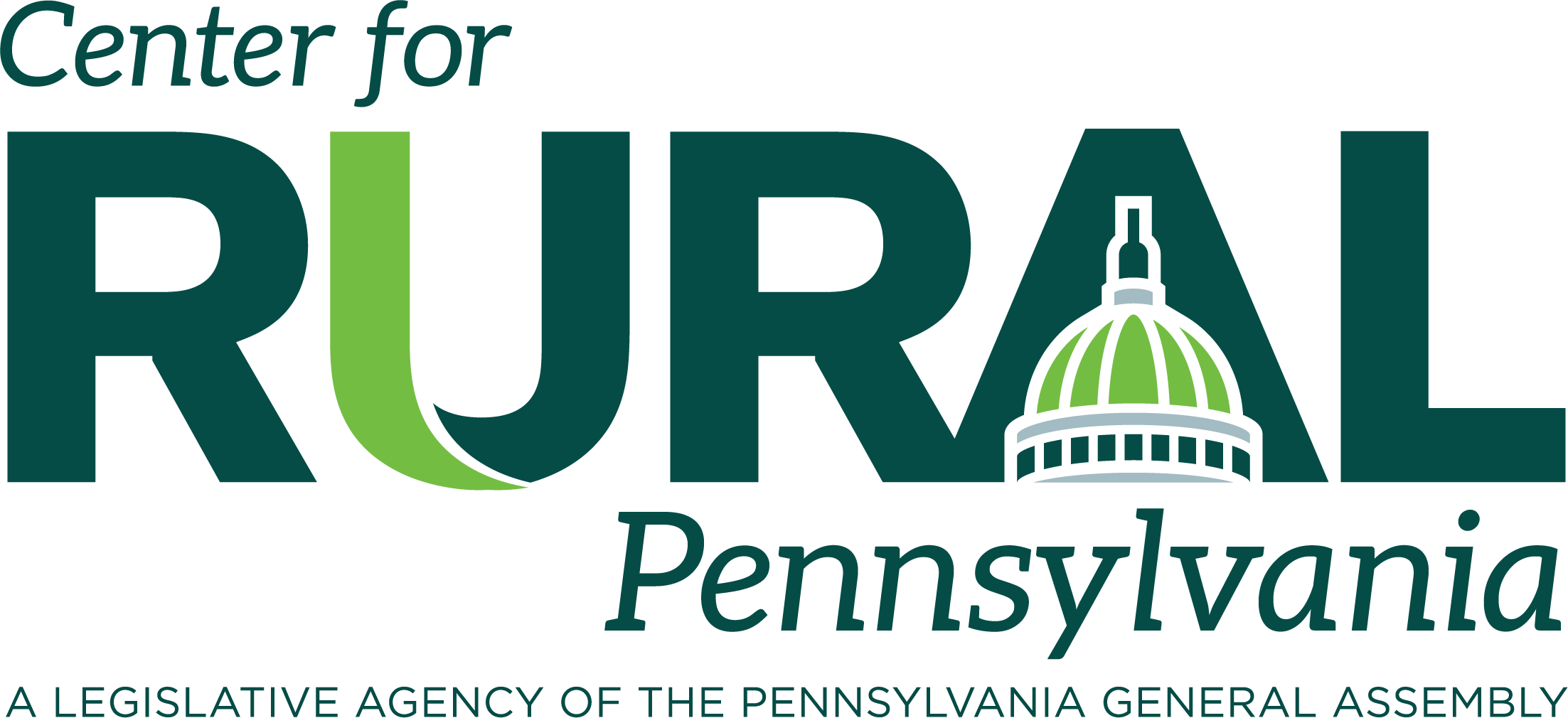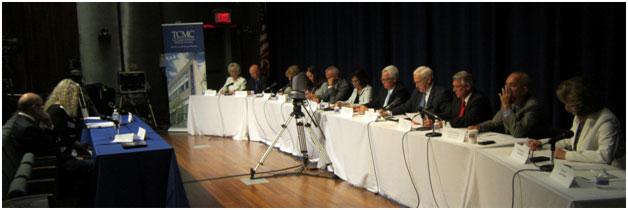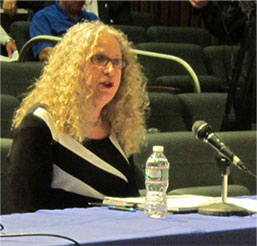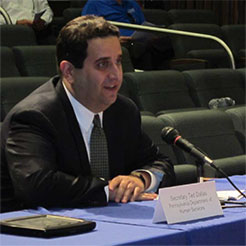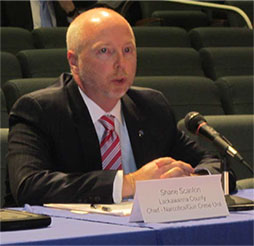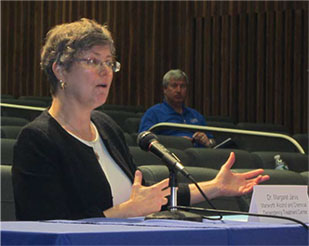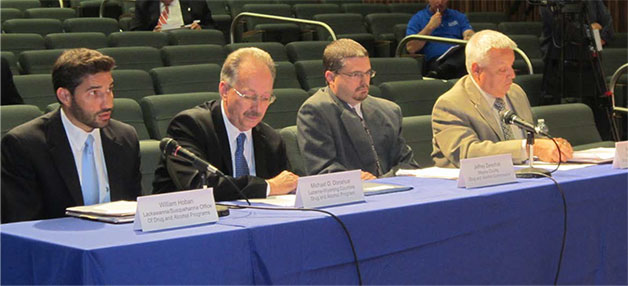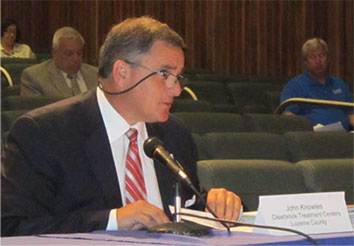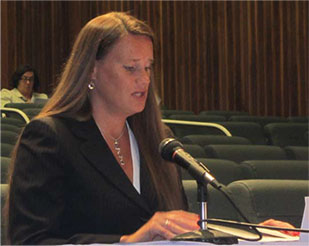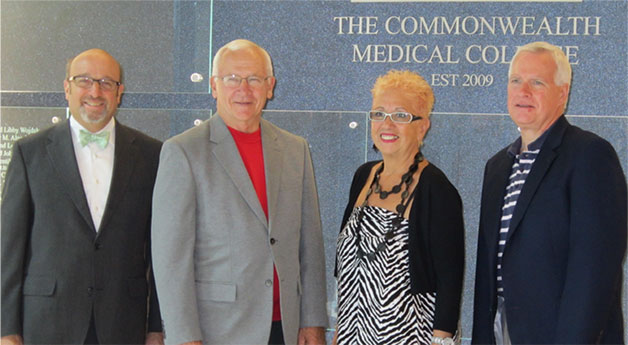Center for Rural Pennsylvania releases second report on Pennsylvania's heroin epidemic
HARRISBURG - The Center for Rural Pennsylvania today announced the release of its most recent report, "Heroin: Combating this Growing Epidemic in PA," which reflects testimony collected during a second round of statewide public hearings held in July and August.
Focusing on treatment and recovery services in Pennsylvania, the Center for Rural Pennsylvania Board of Directors and legislators heard from 40 experts, including treatment professionals, family, law enforcement officials, government officials, and educators, who presented testimony on a range of issues related to treatment and recovery services, and what could be done to help addicts get the treatment they need.
"The Center's work represents the most definitive report that's been done by any state agency on the heroin epidemic plaguing the Commonwealth," said Senator Gene Yaw (R-23), Chairman of the Center's Board of Directors. "Addiction is a chronic disease. It needs to be treated as such and not viewed as a moral deficiency or a matter of choice."
The Center's report summarizes the testimony from three public hearings held in July and August 2015 and includes the recommendations and policy considerations offered by the participants. Some of these include: recognizing that addiction is a disease and those suffering from this disease should be afforded proper treatment; requiring continuing medical education credits on pain management and prescribing practices of opioids for professionals licensed to prescribe in Pennsylvania; expanding the pilot program of early intervention through warm hand-off services statewide; establishing a uniform manner in which overdose deaths, and specifically heroin deaths, are reported and expanding the use of naloxone among local Pennsylvania police departments.
The Pennsylvania State Coroners Association reported that 2,489 individuals died from drug-related causes in 2014, a 20 percent increase from 2013. The association also reported that initial data for 2015 indicated the number of deaths would continue to increase.
The Center for Rural Pennsylvania is a bipartisan, bicameral legislative agency that serves as a resource for rural policy within the Pennsylvania General Assembly. It was created in 1987 under Act 16, the Rural Revitalization Act, to promote and sustain the vitality of Pennsylvania's rural and small communities.
Contact
Barry Denk, Director
Center for Rural Pennsylvania
717.787.9555
Media Advisory: Center for Rural Pennsylvania to release second report on Pennsylvania's heroin epidemic
HARRISBURG - The Center for Rural Pennsylvania, a bipartisan, bicameral legislative research agency of the General Assembly, will release a second report on the heroin crisis facing Pennsylvania during a press conference on Monday, December 7, 2015 in Harrisburg.
The report reflects the issues addressed, and the recommendations made, by 40 presenters at three statewide public hearings held during the summer months and totaling over 11 hours of testimony. The three hearings are in addition to four public hearings held during 2014. Those testifying included educators, elected officials, law enforcement officials, medical and health care professionals, addiction treatment providers, and family members who have lost loved ones.
The report provides recommendations on 11 issues coming from the testifiers requiring additional evaluation, research and possible legislative action.
State Senator Gene Yaw, who represents Bradford, Lycoming, Sullivan, Susquehanna and Union counties, serves as the Center's Chairman. "Heroin and opioid abuse has no geographical boundaries," Yaw said. "This is an epidemic affecting individuals of every age, gender, race, and background across the state."
Contact
Barry Denk, Director
Center for Rural Pennsylvania
717.787.9555
Contact
Christine Caldara Piatos, Communications Manager
Center for Rural Pennsylvania
717.787.9555
With Heroin Overdoses on the Rise, Center for Rural Pennsylvania Addresses National Epidemic
HARRISBURG - The Center for Rural Pennsylvania, a bipartisan, bicameral legislative research agency of the General Assembly, concluded its seventh public hearing on Tuesday, August 18, on heroin and opioid addiction, specifically prevention, recovery, treatment and law enforcement efforts.
The 11-member Center for Rural Pennsylvania Board of Directors, area legislators, state officials, law enforcement officials and state and local treatment service providers participated in the five-hour-long hearing at the Yorktowne Hotel in York County.
"The heroin epidemic has reached epidemic proportions, and has taken center stage on the local, state and national levels," said Sen. Gene Yaw (R-23), Chairman of the Center's Board of Directors. "The Center for Rural Pennsylvania is leading the way to educate policymakers, inform the public, and enhance current policies in Pennsylvania related to heroin and opioid addiction treatment. To date, the Center has received over 30 hours of verbal testimony and 350 pages of written testimony from 90 presenters. The Center has certainly taken a leadership role in this fight."
"Through these (Center) hearings, we are increasing the awareness of the complexity of the heroin epidemic in every aspect and for every individual living in the Commonwealth," said Dr. Nancy Falvo, Center board secretary. "As a nurse and an educator, I am thrilled to be a part of these hearings."
Tuesday's hearing fell on the heels of a White House announcement on a new initiative to pair public health and law enforcement in an effort to shift the emphasis from punishment to addiction treatment. Ironically, at the same time, the federal Food and Drug Administration (FDA) approved the use of OxyContin for children as young as 11 years old with severe pain.
Recent reports indicate that approximately 80 percent of heroin addicts traced their addiction back to prescription opioids. A Centers for Disease Control and Prevention Vital Signs report also confirmed that health care providers wrote 259 million prescriptions for painkillers in 2012, enough for every adult in the United States to have a bottle of prescription painkillers. Further, in 2011, the National Institutes on Drug Abuse (NIDA) estimated that 4.2 million Americans age 12 or older had used heroin at least once in their lives.
In Pennsylvania, the number of fatal heroin overdoses has been steadily increasing. According to a 2014 report from the Pennsylvania State Coroners Association, there were 45 reported heroin deaths in 2009 and 124 reported heroin deaths by mid-2013. Other states across the nation are reporting an increase in heroin use as addicts are shifting from more costly prescription opioids to cheaper alternatives.
"This second round of public hearings reaffirmed that the rise in heroin and opioid abuse has no geographic boundaries, and crosses all socioeconomic groups, all ages and all races," Yaw added. "Those affected could be someone's brother, sister, child, parent or grandparent. No one is immune from this disease."
The Center for Rural Pennsylvania is scheduled to release the findings from the most recent hearings to the General Assembly in the fall.

Pictured left to right: York City Police Chief Wes Kahley, and Jack Whelan, Delaware County District Attorney, testifying during the Aug. 18 Center for Rural Pennsylvania public hearing in York.
For more information please contact Barry Denk or
Contact
Rita Zielonis, Chief of Staff
Nick Troutman, Communications Director
Office of Sen. Gene Yaw
717.787.3280
Public Hearing on Heroin and Opioid Addiction Treatment and Recovery
Center board members and area legislators welcomed presenters and attendees to the last of three public hearings on heroin and opioid addiction treatment and recovery on Tuesday, August 18 at the Yorktowne Hotel in York. Treatment and recovery specialists, health care professionals, state officials, and law enforcement officials presented testimony at the hearing.
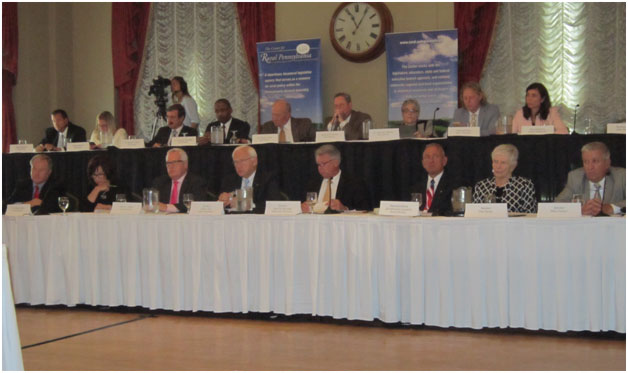
Pictured left to right (bottom row): Sen. Scott Wagner; Dr. Nancy Falvo, Center board secretary; Barry Denk, Center director; Sen. Gene Yaw, Center board chairman; Sen. John Wozniak, Center board vice chairman; Rep. Sid Michaels Kavulich, Center board member; Sen. Pat Vance; Sen. Mike Folmer; (left to right top row) Rep. Seth Grove; Rep. Kate Klunk; Dr. Stephan Goetz, Center board member; Dr. Livingston Alexander, Center board member; Dr. Ted Alter, Center board member; Steve Brame, Center board member; Dr. Karen Whitney, Center board member; Rep. Kevin Schreiber; and Rep. Kristin Phillips-Hill.
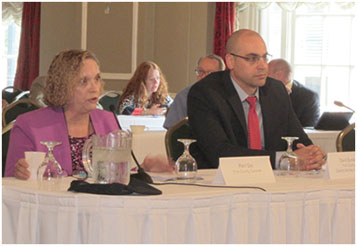
Pictured left to right: Pam Gay, York County coroner, and David Sunday, chief deputy prosecutor, York County District Attorney's Office.
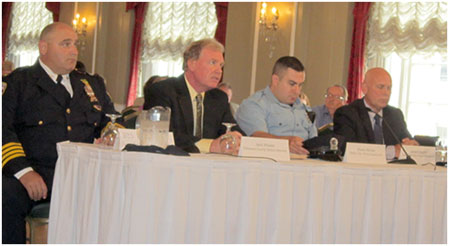
Pictured left to right: York City Police Chief Wes Kahley; Delaware County District Attorney Jack Whelan; Ridley Township (Delaware Co.) Police Officer Shawn McGee; and Penn Township (York Co.) Police Chief James Laughlin.
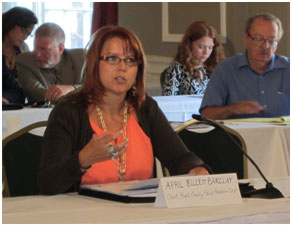
York County Adult Probation Department Chief April Billett Barclay.
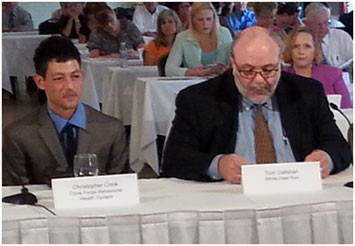
Pictured left to right: Christopher Cook, Project Manager-HOPE Program, Cove Forge Behavioral Health System and Tom Callahan, executive director, White Deer Run.
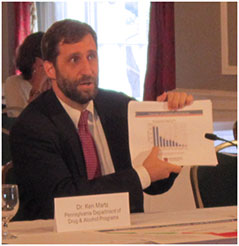
Dr. Kenneth Martz, special assistant to the Secretary, Pennsylvania Department of Drug and Alcohol Programs.
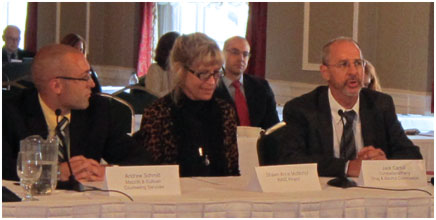
Pictured left to right: Andrew Schmitt, Mazzitti and Sullivan Counseling Services; Shawn Anne McNichol, RASE Project recovery specialist; and Jack Carroll, executive director, Cumberland/Perry Drug and Alcohol Commission.
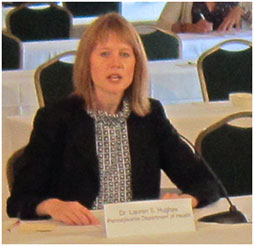
Dr. Lauren Hughes, deputy secretary for Health Innovation, Pennsylvania Department of Health.
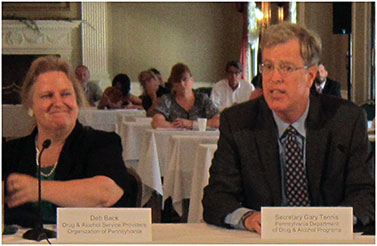
Pictured left to right: Deb Beck, president, Drug and Alcohol Service Providers Organization of Pennsylvania, and Secretary Gary Tennis, Pennsylvania Department of Drug and Alcohol Programs. Indiana County District Attorney Patrick Dougherty, right, and Indiana County Chief Detective David Rostis talked of how law enforcement is working to address the heroin epidemic in their communities and statewide.
Heroin and Opioid Addiction Treatment and Recovery Public Hearing - York
The Center for Rural Pennsylvania has announced the last of three public hearings to be held across Pennsylvania to solicit testimony on heroin and opioid addiction treatment and recovery services. State Senator Gene Yaw, chairman of the Center for Rural Pennsylvania's Board of Directors, says this series of public hearings is intended to continue informing the public of the health crisis of heroin/opioid addiction and fatalities, and to bring greater focus and attention to treatment and recovery services.
In Pennsylvania, the number of fatal heroin overdoses has been increasing. According to a report from the Pennsylvania State Coroners Association, 2,489 individuals died from drug-related causes in 2014, a 20 percent increase from 2013. The association also reported that initial data from 2015 indicate the number of deaths will continue to increase.
Data from the Centers for Disease Control and Prevention (CDC) confirms these sobering statistics, as its 2015 report indicated that heroin overdose deaths in the United States, fueled by lower heroin prices and the increased abuse of prescription opiate painkillers, nearly quadrupled between 2002 and 2013. According to the CDC, reversing these trends will require a wide-ranging response, from improving opioid prescribing practices and expanding access to effective treatment, to increasing the use of medications, such as naloxone, to reverse drug overdoses, to working with law enforcement to disrupt the supply of heroin.
The statewide hearings sponsored by the Center will focus on the issues surrounding the need for effective treatment and recovery services, which includes the increased use of naloxone to save lives.
Public Hearing on Heroin and Opioid Addiction Treatment and Recovery
Center board members welcomed presenters and attendees to the second of three public hearings on heroin and opioid addiction treatment and recovery on Wednesday, July 29 at The Commonwealth Medical College in Scranton. Public and private treatment and recovery specialists, health care professionals, educators, and law enforcement officials presented testimony at the hearing.
Heroin and Opioid Addiction Treatment and
Recovery Public Hearing - Scranton
The Center for Rural Pennsylvania has announced the second of three public hearings to be held across Pennsylvania to solicit testimony on heroin and opioid addiction treatment and recovery services. State Senator Gene Yaw, chairman of the Center for Rural Pennsylvania's Board of Directors, says this series of public hearings is intended to continue informing the public of the health crisis of heroin/opioid addiction and fatalities, and to bring greater focus and attention to treatment and recovery services.
In Pennsylvania, the number of fatal heroin overdoses has been increasing. According to a report from the Pennsylvania State Coroners Association, 2,489 individuals died from drug-related causes in 2014, a 20 percent increase from 2013. The association also reported that initial data from 2015 indicate the number of deaths will continue to increase.
Data from the Centers for Disease Control and Prevention (CDC) confirms these sobering statistics, as its 2015 report indicated that heroin overdose deaths in the United States, fueled by lower heroin prices and the increased abuse of prescription opiate painkillers, nearly quadrupled between 2002 and 2013. According to the CDC, reversing these trends will require a wide-ranging response, from improving opioid prescribing practices and expanding access to effective treatment, to increasing the use of medications, such as naloxone, to reverse drug overdoses, to working with law enforcement to disrupt the supply of heroin.
The statewide hearings sponsored by the Center will focus on the issues surrounding the need for effective treatment and recovery services, which includes the increased use of naloxone to save lives.
Public Hearing on Heroin and Opioid Addiction Treatment and Recovery
Center board members welcomed presenters and attendees to the first of three public hearings on heroin and opioid addiction treatment and recovery on Tuesday, July 21 at Saint Vincent College in Latrobe. Public and private treatment and recovery specialists, health care professionals, educators, and public advocates presented testimony at the hearing.
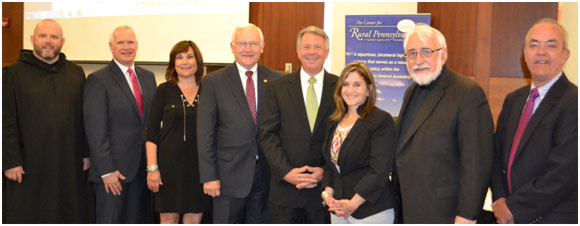
Pictured left to right: Fr. Paul R. Taylor, O.S.B., executive vice president of Saint Vincent College; Barry Denk, Center director; Dr. Nancy Falvo of Clarion University, Center board secretary; Senator Gene Yaw, Center board chairman; Senator John Wozniak, Center board vice chairman; Senator Kim Ward; Br. Norman W. Hipps, O.S.B., president of Saint Vincent College; and Representative Garth D. Everett, Center board treasurer (not pictured: Senator Patrick Stefano).
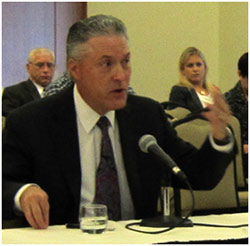
Dr. Neil Capretto, medical director of Gateway Rehab.
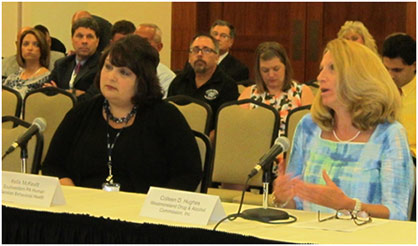
Kellie McKevitt (left), executive for Behavorial Health Services, Southwestern Pennsylvania Human Services and Colleen D. Hughes, executive director, Westmoreland Drug and Alcohol Commission, Inc.
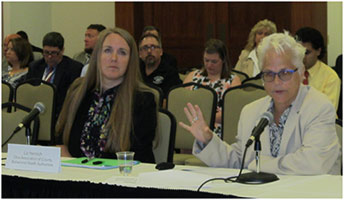
Liz Henrich (left), associate CEO, and Cheri Walter, CEO, Ohio Association of County Behavioral Health Authorities.
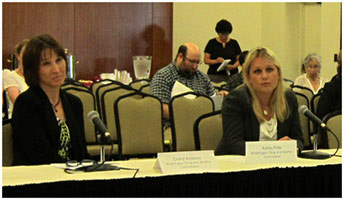
Cheryl Andrews (left), executive director, and Ashley Potts, forensic case manager, Washington Drug and Alcohol Commission.
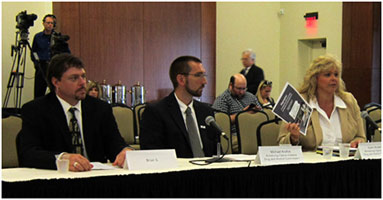
Brian S., Michael Krafick, certified recovery specialist, and Kami Anderson, executive director, Armstrong-Clarion-Indiana Drug and Alcohol Commission.
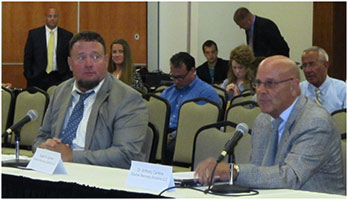
Robert Gorman (left), medical physician assistant and Dr. Anthony Canterna, medical director, Positive Recovery Solutions LLC.
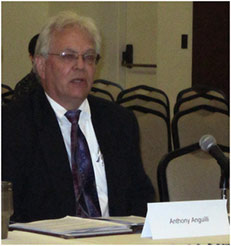
Anthony Anguilli, parent.
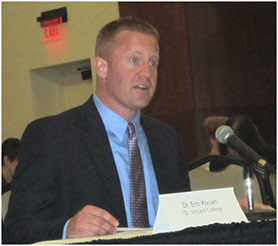
Dr. Eric Kocian, assistant professor, Criminology, Law and Society, Saint Vincent College.

Pictured left to right: Senator Patrick Stefano, Dr. Nancy Falvo, Barry Denk, Senator Gene Yaw and Senator John Wozniak.
Heroin and Opioid Addiction Treatment and Recovery
The Center for Rural Pennsylvania has announced three public hearings to be held across Pennsylvania to solicit testimony on heroin and opioid addiction treatment and recovery services. State Senator Gene Yaw, chairman of the Center for Rural Pennsylvania's Board of Directors, says this series of public hearings is intended to continue informing the public of the health crisis of heroin/opioid addiction and fatalities, and to bring greater focus and attention to treatment and recovery services.
In Pennsylvania, the number of fatal heroin overdoses has been increasing. According to a report from the Pennsylvania State Coroners Association, 2,489 individuals died from drug-related causes in 2014, a 20 percent increase from 2013. The association also reported that initial data from 2015 indicate the number of deaths will continue to increase.
Data from the Centers for Disease Control and Prevention (CDC) confirms these sobering statistics, as its 2015 report indicated that heroin overdose deaths in the United States, fueled by lower heroin prices and the increased abuse of prescription opiate painkillers, nearly quadrupled between 2002 and 2013. According to the CDC, reversing these trends will require a wide-ranging response, from improving opioid prescribing practices and expanding access to effective treatment, to increasing the use of medications, such as naloxone, to reverse drug overdoses, to working with law enforcement to disrupt the supply of heroin.
The statewide hearings sponsored by the Center will focus on the issues surrounding the need for effective treatment and recovery services, which includes the increased use of naloxone to save lives.
For more information please contact Barry Denk or Christine Caldara Piatos or email us at info@rural.palegislature.us.
Public Hearings on Heroin and Opioid Addiction Treatment and Recovery
The Center for Rural Pennsylvania has scheduled three public hearings to gather testimony on heroin and opioid addiction treatment and recovery services in Pennsylvania. The hearing dates/locations/times are:
Center for Rural Pennsylvania Schedules Three
Hearings on Heroin, Opioid Treatment
HARRISBURG - The Center for Rural Pennsylvania Board of Directors announced this week that it has scheduled three additional hearings to discuss heroin and opioid treatment and recovery efforts. The announcement came at its June 15th Board meeting in Harrisburg.
The public hearings will take place on July 21st in Latrobe, July 29th in Scranton and August 18th in York. Each hearing has been scheduled to run from 10AM to 1PM.
The Center Board of Directors, consisting of members of the Senate, House of Representatives, Governor appointees and academia, were joined by legislators from across the state last summer at four public hearings to examine the heroin epidemic.
Legislative action was urged by those who testified, including Pennsylvania Attorney General Kathleen Kane and Secretary of Drug and Alcohol Programs Gary Tennis.
Three primary themes repeatedly mentioned during the hearings included: educating individuals to the dangers of opioid abuse; increasing the accessibility and availability for those seeking treatment; and providing law enforcement with the tools to help eradicate heroin from our communities.
In September 2014, the Center issued a final report with specific legislative recommendations regarding the Prescription Drug Monitoring Program and the use of Naloxone, along with nineteen programming actions for consideration. Legislation addressing the recommendations was passed into law by November 2014.
"This epidemic affects individuals of every age, gender, race, and background," said Senator Gene Yaw, Center board chairman. "The increased use of heroin, which often has roots in the abuse of prescription painkillers like Vicodin and OxyContin, has catapulted Pennsylvania to seventh in the nation for drug-related overdose deaths in the latest federal statistics."
In the coming months, the Center Board aims to discuss treatment and recovery options, including the use of naloxone, an antidote to a heroin overdose, by local law enforcement agencies.
Barry Denk, Center director, said: "The Board's actions reinforce the Center's commitment to addressing critical and timely issues affecting Pennsylvania. Through this next round of hearings, we expect to learn more about effective treatment methods and the critical support services for individuals in recovery, and their families."
For more information please contact Barry Denk.
